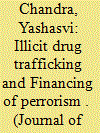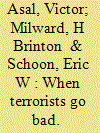| Srl | Item |
| 1 |
ID:
170562


|
|
|
|
|
| Summary/Abstract |
The revenue generated from the drug trafficking business constitutes a fifth of the organised crime revenues, with annual worldwide value of the trade estimated to be around $650 billion. As the trafficking of drugs provides a lucrative opportunity, transnational terror groups such as Al- Qaeda, the Islamic State and their affiliates are increasingly using illicit drug trade to fund their expenses and operational costs. Further, with the increasing surveillance of the funding routes of terror by the security forces, the traditional sources of revenue have dried up. The investment in drug trafficking is low, and profits are high. Drug trade, therefore, provides terror groups with an adequate and sustained alternative means to generate funds.
|
|
|
|
|
|
|
|
|
|
|
|
|
|
|
|
| 2 |
ID:
138303


|
|
|
|
|
| Summary/Abstract |
The intersection of terrorism and organized crime is a central global security concern. However, the conditions that contribute to this intersection or hinder its development are widely debated. Drawing on prominent cases of ideologically driven violent nonstate actors engaged in illicit economies, some scholars argue that this intersection is a logical evolution. Other scholars, focusing on the fact that relatively few groups engage in both organized crime and terrorism, argue that ideological differences hinder this intersection. We use data on 395 terrorist organizations to analyze how organizational and environmental factors affect the likelihood of terrorist involvement in illicit drug trafficking. Our analysis shows that the degree of connectivity within networks of terrorist groups is the most significant predictor of a group engaging in drug trafficking. Further, contrary to the theorized effects of ideology, an explicit religious ideology has no significant effect while an ethnopolitical ideology actually increases the likelihood of drug trafficking.
|
|
|
|
|
|
|
|
|
|
|
|
|
|
|
|